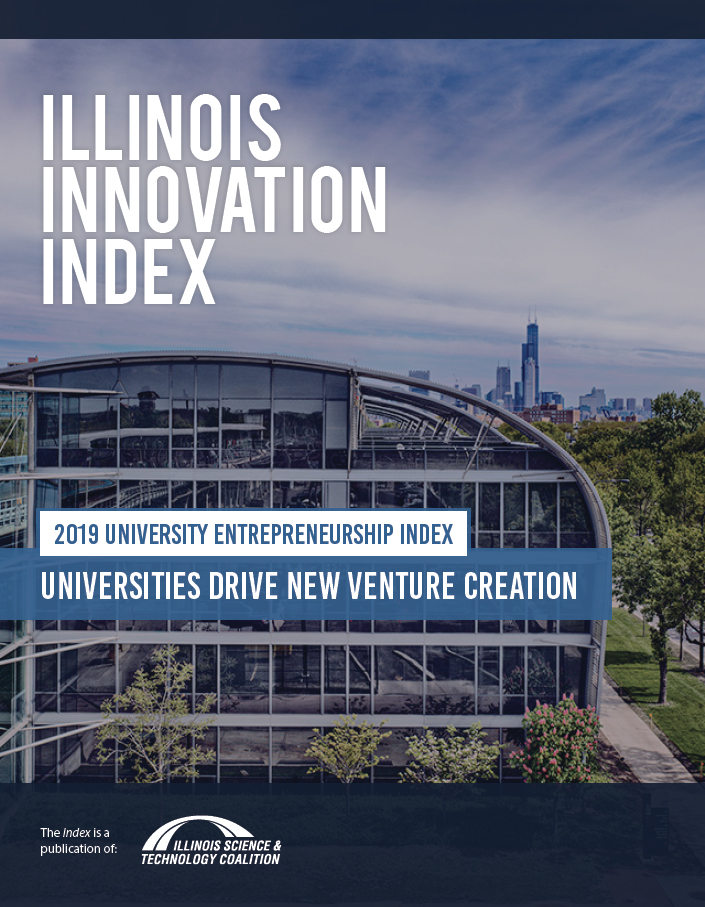2019 University Entrepreneurship Index
Universities Drive New Venture Creation
CONTENTS
Introduction
Startup Creation
- Startup Activity Reaches All-Time High
- Startup Industries Led by Biotech & IT
- New Ventures Spur Job Creation
- University Incubators and Research Parks Illinois’ STEM Degrees Reach New Record High
Investment
- Startup Funding Surpasses $1 Billion
- Biotech Startups Dominate Funding
- Direct University Investment Bridges Funding Gap
- I-Corps and SBIR/STTR Valuable Tools for Startups Growth
Founders
Commercialization & Tech Transfer
Looking Forward
Introduction
Illinois’ universities are engines of innovation and economic growth. Each year they bolster the state’s talent pipeline with 25,000 new STEM graduates and drive discovery by conducting $2.4 billion in research & development activity. Over the past decade, Illinois’ universities have also increased efforts to ensure that innovations made possible by university research are able to reach the commercial marketplace through technology transfer and the creation of startup companies. By doing so, universities create economic growth through innovation and job creation.
This 2019 University Entrepreneurship issue marks 10 years of university-supported startup data tracked by the Illinois Innovation Index. Spurred by an increase in resources and support—as well as better tracking of startups by universities—we’ve seen explosive growth in entrepreneurial activity over the past decade. This year’s issue continues that trend, with a record number of startups founded, and funding raised, over the past five years. This issue is also the first to include an analysis of job creation, further highlighting the direct economic impact of university-supported entrepreneurship.
KEY FINDINGS
- Over the past five academic years (2013-2014 through 2017-2018), students and faculty at Illinois’ universities have founded 978 startups, the largest volume of startup activity for any five-year period tracked by the Index. This level of startup activity represents an increase of 153 percent over the previous five-year period, when 386 startups were founded.
- Nearly two-thirds (65.5 percent) of startups founded over the past five years remain active, while 32.8 percent are inactive, and 1.6 percent have been acquired.
- Tech transfer startups—those backed by university IP—are significantly more likely to remain active at the five-year mark (78.1 percent), compared with non-tech transfer startups (45.9 percent).
- Among active startups founded over the past five years, 80 percent are located in Illinois (513 startups), up from 70.1 percent over the previous five-year period. The consistently high share of startups located in Illinois is a credit to the pipeline that has developed between universities and the state’s larger network of support resources.
- By industry, startup activity is led by biomedical & biotechnology (16 percent); software & IT (15 percent); healthcare & social services (10 percent); and retail, wholesale goods, ecommerce (10 percent).
- An estimated 3,000 jobs have been created by startups founded over the past five years. Of these jobs, 2,600 remain active and 1,700 are located in Illinois.
- Startups founded over the past five years have raised $1.24 billion in funding. The first time funding has surpassed $1 billion for startups founded over a five-year period.
- Nearly three out of four startups that receive funding are located in Illinois. However, nearly two-thirds (62.5 percent, 12 startups) of startups that have raised more than $10 million are located outside the state.
- Funding is dominated by startups in biomedical & biotechnology, which have raised $583 million. Startups in retail, wholesale goods, ecommerce ($131 million) and transportation ($130 million) have also raised more than $100 million in funding.
- Illinois ranks 13th nationally in SBIR/STTR funding awarded to all companies, receiving $52.9 million in 2017. SBIR/STTR funding has increased just 1.7 percent annually in Illinois since 2013, compared with 4 percent annual growth nationally. University-supported startups founded over the past five years have raised $41.6 million in SBIR/STTR awards.
- The number of startups utilizing the NSF I-Corps program has increased, with 173 startups participating over the last five years. Startups participating in I-Corps are more than three-times more likely to receive SBIR/STTR funding.
- Thanks to university efforts to increase diversity and inclusion in entrepreneurship, an estimated 33 percent of startups founded over the past five years have at least one female founder, nearly twice the national average of 17 percent.
- Foreign-born founders are critical to new venture creation. Of startups founded over the past five years, an estimated 37 percent have at least one foreign-born founder. This finding illustrates the need for a startup visa in the US, which would allow these founders to stay in the country to build their startups.
- Commercialization activity has seen mixed growth in recent years. In 2017, Illinois universities disclosed 748 inventions, were awarded 250 patents, and created 173 license and options agreements. Illinois also ranks third nationally in license income, bringing in $1.37 billion since 2013.
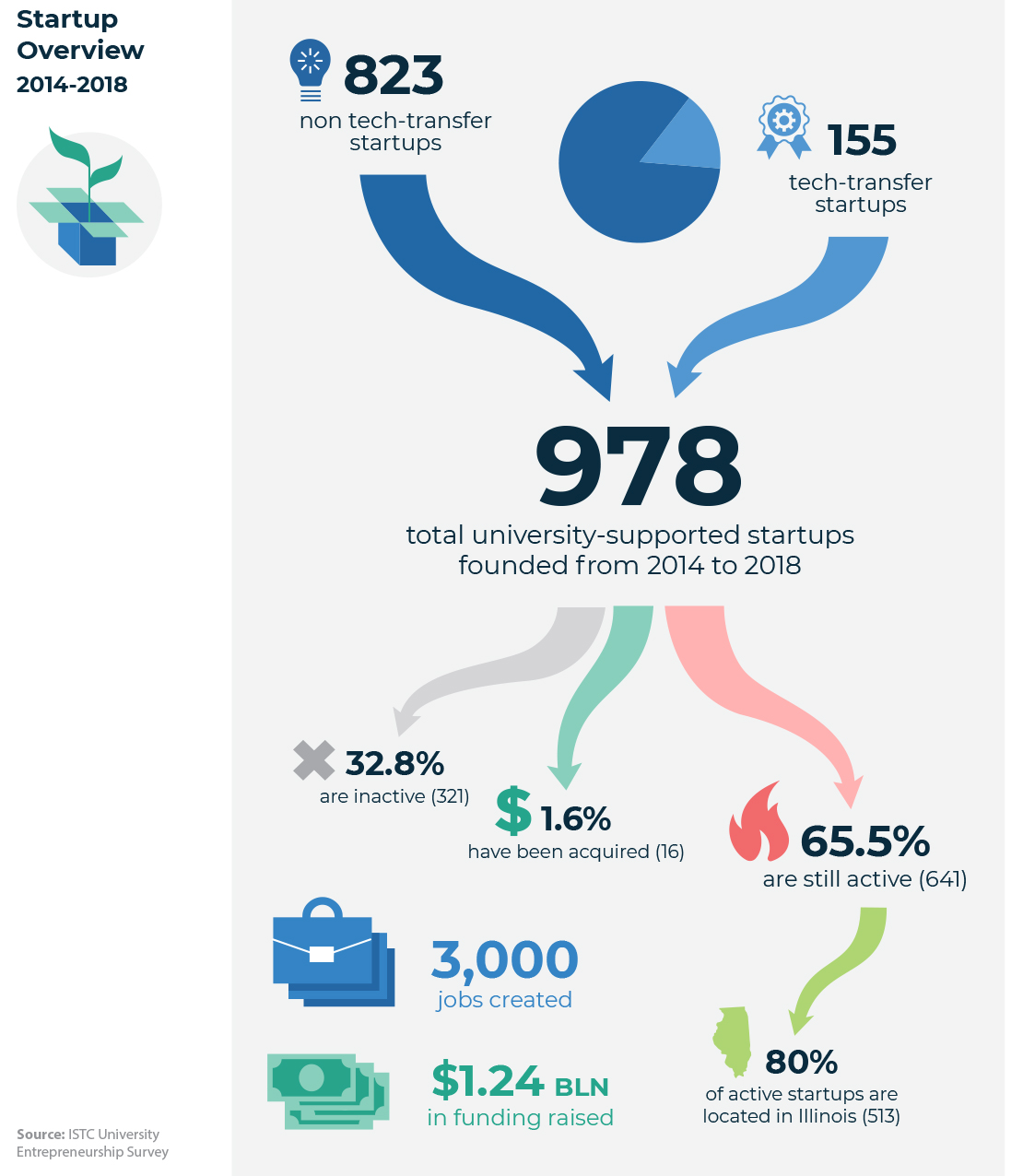
Startup Creation
Startup Activity Reaches All-Time High
In the five academic years from 2013-2014 through 2017-2018,[1] Illinois students and faculty founded 978 startup companies. This startup activity represents an increase of 153 percent compared with the previous five-year period, from 2008-09 through 2012-2013, when 386 startups were founded.
The explosive growth of university-supported startup activity can be largely attributed to startups that do not license university technology (referred to in this Index as non-tech transfer startups). These startups are typically catalyzed by university entrepreneurship center resources, including incubation spaces, accelerator programs, and pitch competitions. Compared with startups licensing university technology (referred to in this Index as tech transfer startups), these startups are also far more likely to be founded by students. Over the past five years, 823 non-tech transfer startups have been spun out of Illinois universities, a 215 percent increase over the previous five year period, when 261 non-tech transfer startups were founded.
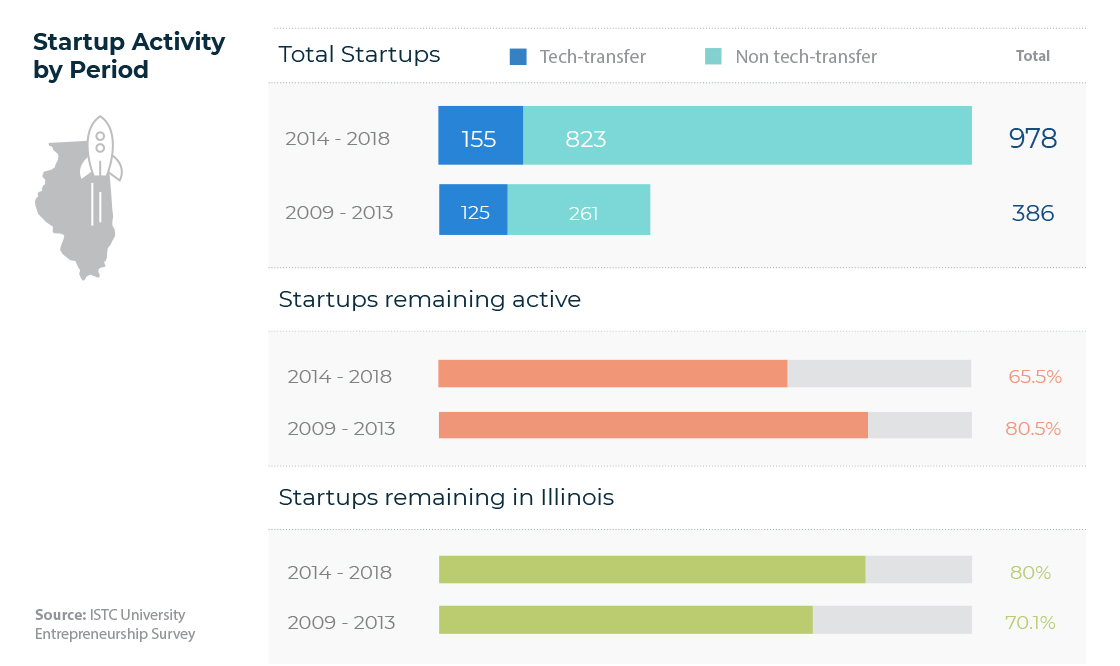
Of the 978 total startups founded over the past five years, 65.5 percent remain active (641 startups), while 32.8 percent are inactive (321 startups), and 1.6 percent have been acquired (16 startups). Among startups founded during the 2013-2014 academic year (those approximately five years old), 52.1 percent are still active. This mirrors national data on startup viability. Nationwide, roughly half of startup companies remain active at the five-year mark.[2] However, tech transfer startups backed by university intellectual property (IP) are significantly more likely to remain active after five years. More than three-quarters of tech transfer startups (78.1 percent) founded during the 2013-2014 academic year remain active, compared with 45.9 percent for non-tech transfer startups.
Among active startups founded over the past five years, 80 percent are located in Illinois (513 startups). The share of startups located in Illinois has risen compared with the previous five-year period, when 70.1 percent of startups were located in Illinois. The increasing share of startups located in the state is a credit to the pipeline that has been built from universities to support resources provided by Illinois’ larger startup ecosystem.
UI Research Park Expanding to Accommodate Growth
2019 marks 20 years since the University of Illinois Research Park was established in Urbana to assist the university’s world-class researchers commercializing new technologies and promote collaboration with the state’s business community. The Research Park has grown to include 17 buildings covering 790,000 square feet, occupied by more than 120 companies and employing 2,100 people. The Research Park includes the EnterpriseWorks technology incubator, a dedicated 43,000 square foot facility to help launch successful student and faculty startup companies.
To accommodate the Research Park’s growth, the university plans to expand the Research Park and its EnterpriseWorks incubator. The plan includes a new 40,000 square foot expansion of EnterpriseWorks, including new lab facilities for deep-tech startups, which are currently limited in the region. The new building will also include space for the Research Park community, providing an environment for creative collisions between companies, employees, and faculty.
Startup Industries Led by Biotech & IT
By industry, startup activity is led by biomedical & biotechnology (16 percent); software & IT (15 percent); healthcare & social services (10 percent); and retail, wholesale goods, ecommerce (10 percent). More than half of all tech transfer startups are in biomedical & biotechnology (54 percent), while non-tech transfer startups are most commonly in software & IT (17 percent); retail, wholesale goods, ecommerce (12 percent); and healthcare & social services (12 percent).
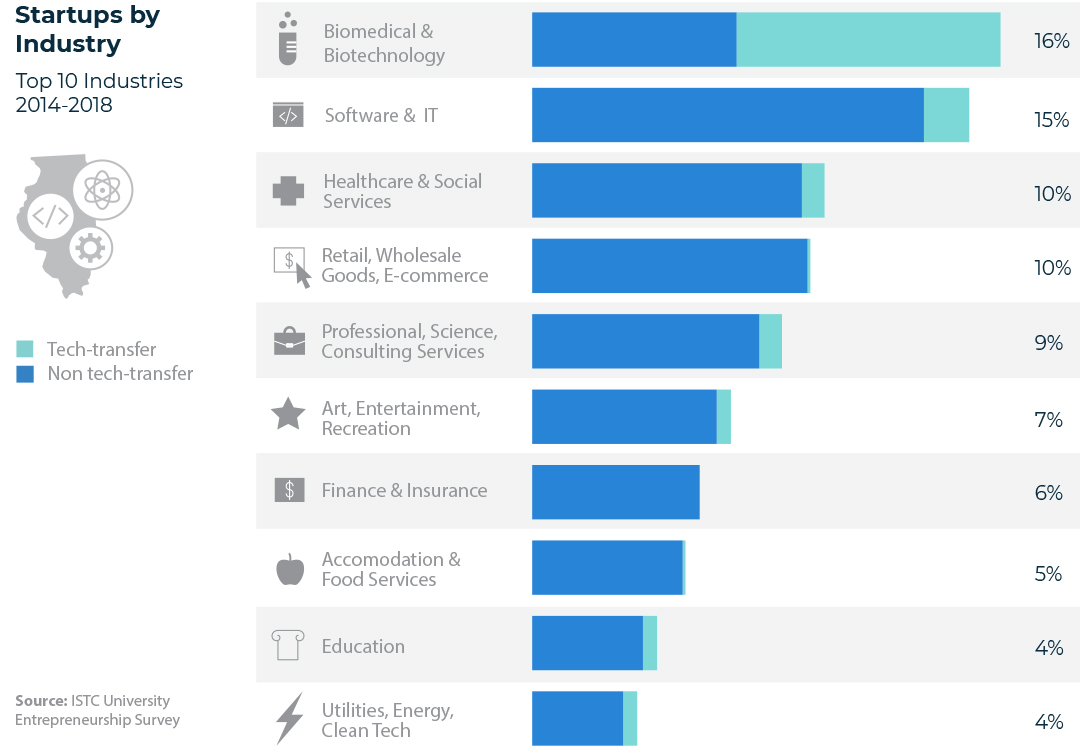
Lake Forest College Fostering Student Entrepreneurship
The Entrepreneurship and Innovation program at Lake Forest College prepares students to find problems worth solving and mobilizing the people, networks, and resources to solve them. Students in the program tailor their courses and internships to align with their innovation interests (intellectual property, product development, social or corporate innovation) and entrepreneurship goals (self-employment, small business ownership, nonprofit leadership, high-potential startups, or corporate intrapreneurship). Lake Forest’s Entrepreneurship and Innovation program also includes a focus on fostering psychological resilience in its learning objectives for every course. While completing the program, students learn frameworks to reframe failure, manage adversity, fearlessly ask, build networks of support, and navigate tough conversations to better prepare them for success in our rapidly changing world.
New Ventures Spur Job Creation
For the first time, Index analysis of startup activity includes job creation.[3] Startups founded over the past five years have created an estimated 3,000 jobs. Of these jobs, approximately 2,600 remain active. Among active jobs, around two-thirds are located in Illinois (1,700 jobs), while one-third are located outside Illinois (900 jobs). The number of jobs created by these startup companies illustrate the direct economic impact of university-supported entrepreneurship efforts. However, the number of these jobs located outside the state represents an opportunity to further grow Illinois’ high-tech economy by stepping up retention efforts.
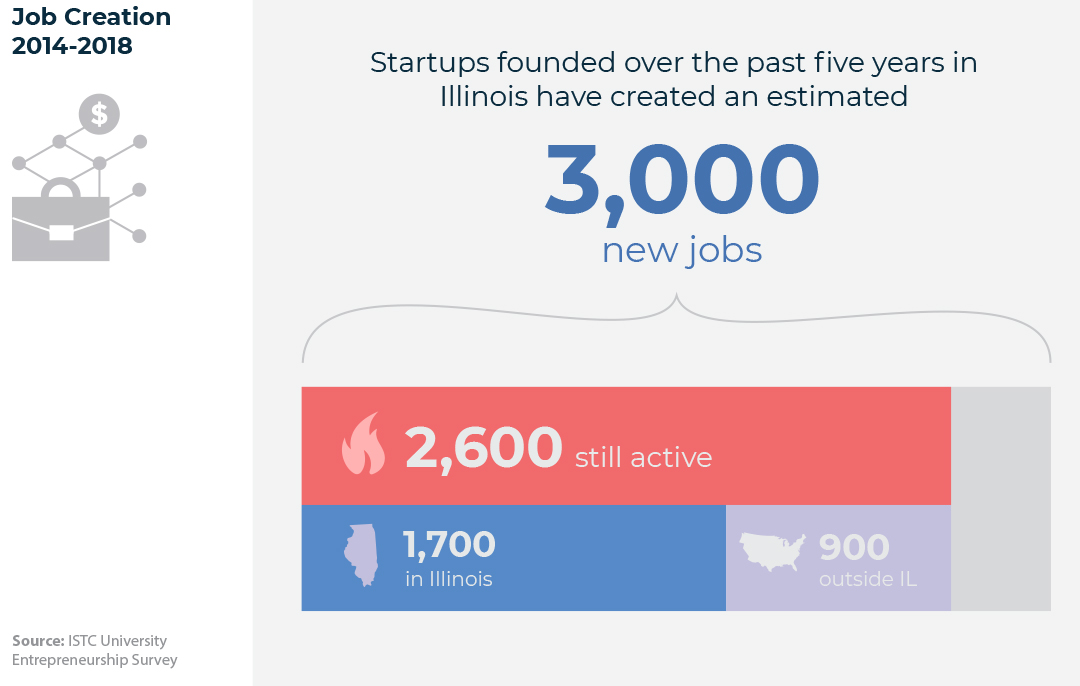
Over the past decade, universities in Illinois have created and grown their own vibrant startup ecosystems. These ecosystems are anchored by university-managed incubators and entrepreneurial hubs—including Bradley University’s Peoria NEXT Innovation Center; Illinois State University’s Means Center; Illinois Tech’s University Technology Park and Kaplan Institute; Northern Illinois University’s EIGERlab; Northwestern’s The Garage; Rosalind Franklin University’s Innovation and Research Park; Southern Illinois University Carbondale’s Research Park and Small Business Development Center; Southern Illinois University Edwardsville’s University Park; University of Chicago’s Polsky Center; University of Illinois at Chicago’s Health Technology Incubator; University of Illinois Springfield’s Innovate Springfield; University of Illinois at Urbana-Champaign’s Research Park and EnterpriseWorks incubator; and Western Illinois University’s Quad City Manufacturing Lab.
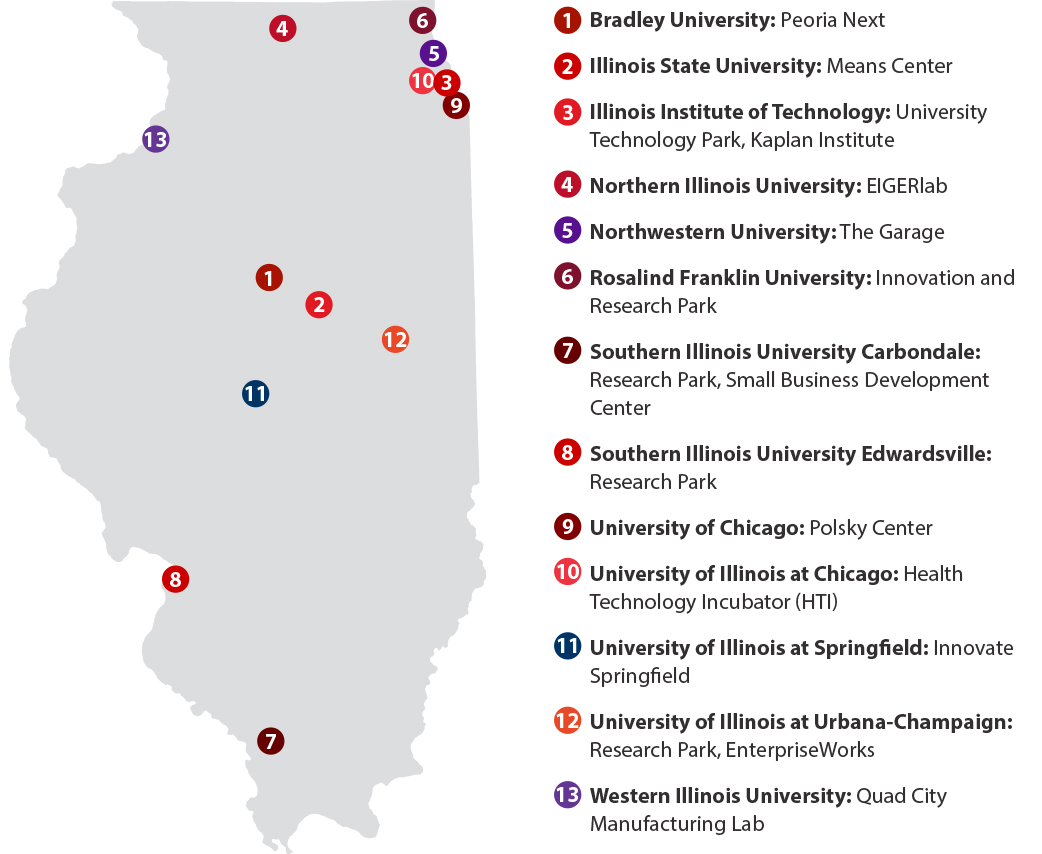
Supporting many of these university incubators and entrepreneurship centers is the Illinois University Incubator Network (IUIN), led by the University of Illinois’ EnterpriseWorks incubator. With funding from the US Economic Development Agency, the IUIN supports universities with best practices, shared documents, and planning for new facilities. IUIN also provides free services, including SBIR grant technical assistance and direct startup support through students paid to assist with project delivery.
A key factor in the retention of Illinois’ university-supported startups is the ability to connect directly with an ecosystem of incubators, accelerators, capital, and talent once they leave campus. This includes Illinois’ network of organizations and initiatives dedicated to supporting and funding entrepreneurs. Growing resources include 1871, BLUE1647, Built in Chicago, Catapult Chicago, ChicagoNEXT, Future Founders, ICNC, Illinois Technology Association, mHUB, MxD, TechNexus, Techstars, and many more. Industry-specific resources include 2112, CBC Accelerator Network (CBCAN), Chicago Innovation Mentors, Clean Energy Trust, Current, Energy Foundry, iBIO Institute, MATTER, and The Hatchery.
Rosalind Franklin Launching New Life Sciences Research Park and Incubator
Opening in early 2020, the new Innovation and Research Park at Rosalind Franklin University of Medicine and Science will serve as an environment where academia and industry can work side by side to achieve common goals. When completed, the new facility will include 100,000 square feet of laboratory and office space, increasing interaction and the free exchange of ideas, expertise, and tools among researchers. Included in the facility is dedicated space for the university’s Helix 51 incubator. Helix 51 assists faculty and regional start-up companies, facilitating their formation and accelerate their success. In addition to Helix 51, the SmartHealth Activator provides support to accelerate the commercialization of drugs, diagnostics, and medical devices being developed at Rosalind Franklin and the Innovation and Research Park.
Startup Spotlight: EarthSense
EarthSense is an AgTech startup harnessing the power of autonomous robotics to monitor crops. Founded in 2016 by University of Illinois professors Girish Chowdhary and Chinmay Soman, EarthSense develops small autonomous robots that navigate through fields, returning valuable data that allow farmers to make informed decisions about their crops. EarthSense’s newest robot, TerraSentia, uses visual cameras, LIDAR and other on-board sensors to measure plant health, physiology, stress response, and other factors that are traditionally difficult to assess.
EarthSense has been named to SuccessfulFarming’s 8 AgTech Start-Ups Worth Watching in 2019 and AgFunder’s 12 Startups to Watch. The company is also a finalist in the Hello Tomorrow Global Challenge and has been invited to present at the Global Forum for Innovation in Agriculture. EarthSense has received funding through SBIR, and is currently closing its seed funding round. The company is based at the University of Illinois Research Park in Urbana.
Investment
Startup Funding Surpasses $1 Billion
For the first time since the Index began tracking university-supported entrepreneurship, funding raised by startups founded over the past five years surpassed $1 billion. Startups founded from 2014 to 2018 have raised $1.24 billion in funding. This funding includes venture capital and angel investment; grant funding, including SBIR/STTR; funding provided by universities; and more. The $1.24 billion raised by startups founded over the past five years represents a significant increase compared with the previous five-year period, when startups raised $156 million.
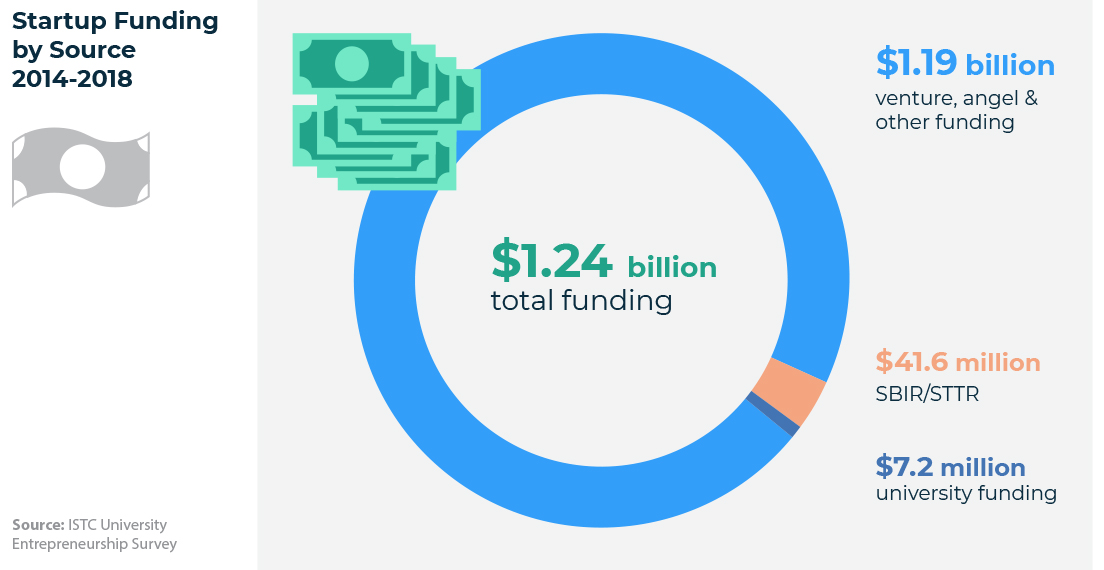
Startup funding is more concentrated among tech transfer startups. Tech transfer startups raised an average of $6.5 million in funding, compared with $1.9 million for non-tech transfer startups. This is due in large part to the number of biomedical and biotechnology tech transfer startups, which have raised nearly $530 million. Biomedical and biotechnology startups often require a large amount of early stage funding to complete medical trials necessary when commercializing a new therapy.
Biotech Startups Dominate Funding
By industry, startup funding is dominated by startups in biomedical & biotechnology, which have raised $583 million. Among this funding in biomedical & biotechnology is headlined by Aptinyx, Revolution Medicines, Corvidia, and Oncorus, which have collectively raised more than $400 million in funding. Startups in both retail, wholesale goods, ecommerce ($131 million) and transportation ($130 million) have also raised more than $100 million in funding. Standout startups in these industries include shoemaker Allbirds, and transportation logistics startup FourKites.
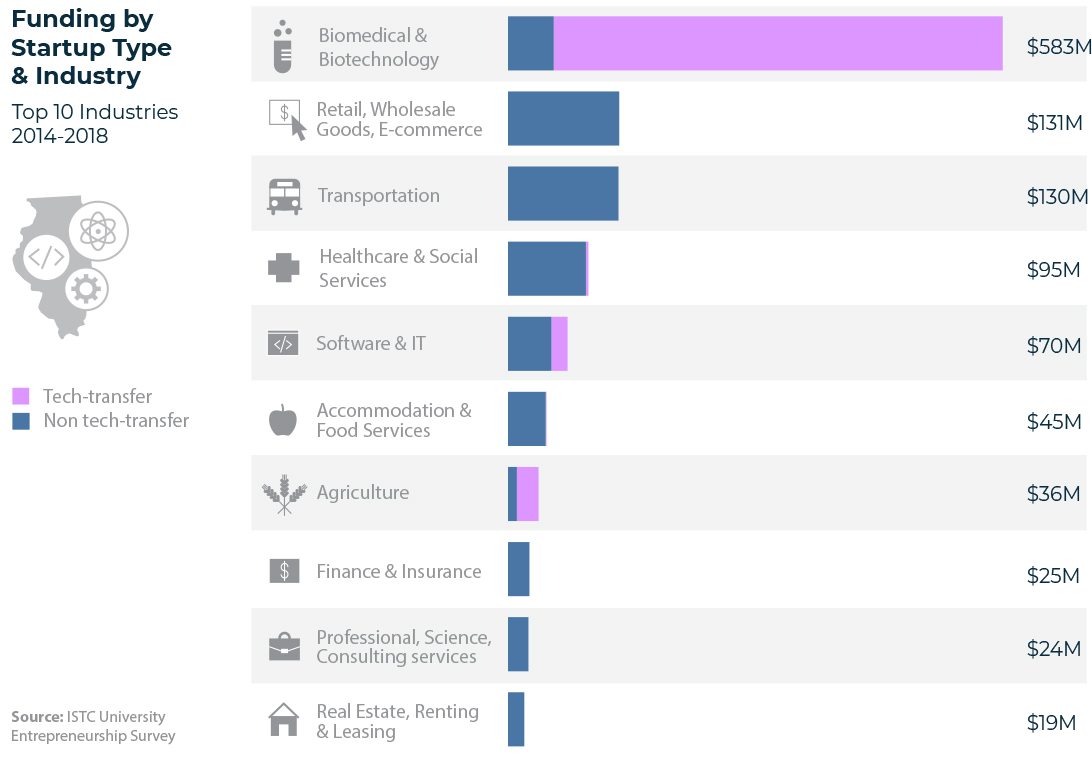
Though nearly three out of four university-supported startups that receive funding are located in Illinois, those that have secured higher levels of investment are more likely to be locate outside the state. Nearly two-thirds (62.5 percent, 12 startups) of startups that have raised more than $10 million are located outside Illinois. However, a majority of these venture-backed startups located outside Illinois have never had a physical presence in the state. Instead, they are licensing IP from one of Illinois’ universities, or have an Illinois university faculty member on the founding team.
Chicago Biomedical Consortium Launches New Accelerator Award
Founded in 2001, the Chicago Biomedical Consortium (CBC) exists to stimulate collaboration between scientists at Northwestern University, The University of Chicago, and the University of Illinois at Chicago. To further life science ventures created by faculty at these universities, CBC created the CBC Accelerator Network (CBCAN). CBCAN brings together industry experts, university tech transfer officers, researchers, and others in the biomedical ecosystem to guide innovations into the pipeline towards commercialization. In 2018, the CBC launched its new Accelerator Award to support researchers in the commercialization pipeline. Accelerator Awards are used to support the initial stage of research focused on the development of a new therapeutic, biomarker, or diagnostic. The Award also encourages interactions between academic researchers and industry representatives early in the development cycle and provides guidance toward reaching commercialization milestones. Accelerator Awards provide up to $100,000 in funding for one year, with the opportunity to apply for $150,000 for one additional year.
Startup Spotlight: Oxalo Therapeutics
Oxalo is a biotechnology startup developing a first-of-its-kind treatment for kidney stones and related oxalate diseases. The startup was co-founded in 2018 by Dr. Hatim Hassan, an assistant professor of medicine at the University of Chicago, and Yang Zheng, an MBA student at the UChicago’s Booth School of Business. Though about 1-in-10 people will have a kidney stone at some point in their lives, current standard of care for high-risk patients typically relies on drinking more water or adjusting diet. Oxalo is developing a daily pill that aims to remove oxalate from the blood and urine in order to reduce or eliminate kidney stones and other severe oxalate pathologies.
In 2018, Oxalo was named a finalist in UChicago’s New Venture Challenge and received investment from the UChicago Innovation Fund. The startup was then awarded $2.3 million from the National Institutes of Health’s Small Business Technology Transfer (STTR) program, which supports companies bringing innovations to the market. Oxalo was also one 128 companies selected to participate in the 2018 MassChallenge accelerator in Boston, where it was named a Platinum Winner. Building on early success, Oxalo hopes to begin clinical trials within two and a half years.
Direct University Investment Bridges Funding Gap
In recent years, universities in Illinois have grown efforts to provide funding support for their early-stage startups. This funding support can take several forms, from competition prizes to equity investments. University investment funds include IllinoisVENTURES at the University of Illinois; the Chancellor’s Innovation Fund at the University of Illinois at Chicago; the George Shultz Innovation Fund at the University of Chicago; and the N.XT Fund and NUSeeds at Northwestern University. Statewide, universities in Illinois invested $7.2 million in 220 startups founded from 2014 to 2018. These investments are generally small (median of $10,000), but allow early stage startups to build commercial prototypes, validate their target markets, refine their business models, or recruit key management, while also positioning the startup for further investment.
Startup Spotlight: BrewBike
BrewBike is a mobile coffee startup aiming to change the way coffee is sold on college campuses. Founded in 2015 by Lucas Philips, an undergraduate at Northwestern University, BrewBike brings fresh cold-brew coffee to students via custom-made cargo bikes, micro-retail shops, and cold brew keg subscriptions. Based on the company’s success at Northwestern, BrewBike is now expanding to other campuses around the country by empowering teams of undergraduate students to launch, grow, and manage their own BrewBike. Thus far, the company has sold 35,000 cups of coffee and employs over 60 students at both Northwestern and the University of Texas at Austin.
In 2016, Philips raised $10,000 through a crowdfunding campaign to get BrewBike off the ground. During BrewBike’s first year in operation, Philips participated in the 2016 Wildfire Pre-Accelerator at The Garage, receiving $10,000 and 10-weeks of entrepreneurial training. As the company grew, Philips recruited Randy Paris, a recent graduate of the University of Chicago Booth School of Business, to join the company as CEO. Under the leadership of Philips and Paris, BrewBike made the finals of the University of Chicago’s New Venture Challenge and placed 2nd at Northwestern’s VentureCat competition in 2018. BrewBike was also one of four Chicago-area startups chosen to participate in the Pritzker Group Venture Fellows Program in 2018. In total, BrewBike has raised over $800,000 in funding, including investment from Northwestern’s NUSeeds fund.
I-Corps and SBIR/STTR Valuable Tools for Startups Growth
The federal government plays a significant role in catalyzing startup growth through the Small Business Innovation Research (SBIR) and Small Business Technology Transfer (STTR) programs. These programs are offered by federal agencies to encourage small businesses to engage in research and development that has the potential for commercialization. SBIR/STTR funding can be vital as startups move from the proof of concept stage toward commercialization.
Overall, Illinois ranks 12th by number of companies receiving SBIR/STTR awards, with 125 in 2017.[4] The number of awards received in Illinois has remained nearly flat since 2013, when companies in the state received 124 awards. Illinois ranks 13th in award amount, receiving $52.9M in SBIR/STTR funding in 2017. SBIR/STTR funding has increased just 1.7 percent annually in Illinois since 2013, compared with 4 percent annual growth nationally.
Among university-supported startups founded over the past five years, 65 received have SBIR/STTR funding. These startups have been awarded $41.6 million in SBIR/STTR grants.[5] Receiving SBIR/STTR funding dramatically increases the viability of university-supported startups. Among startups receiving SBIR/STTR, 98.5 percent remain active or have been acquired, compared with 65 percent of startups that have not received SBIR/STTR. These startups are also more likely to be located in Illinois (82.3 percent vs. 79.8 percent).
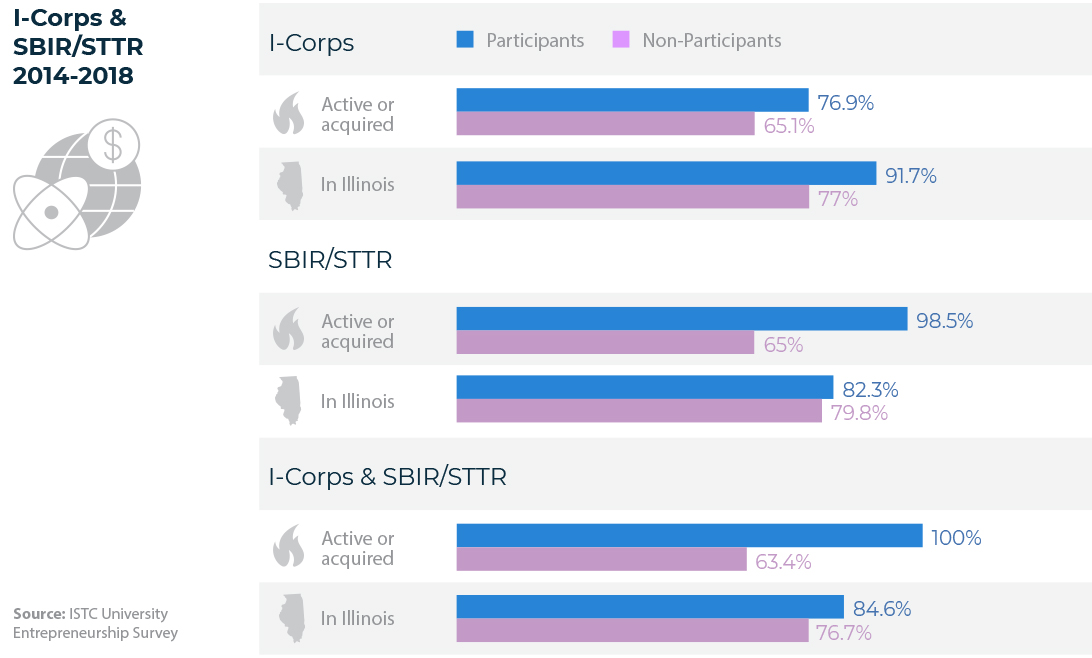
One proven path to valuable SBIR/STTR funding, and increased viability, is the National Science Foundation’s I-Corps program. I-Corps participants learn to identify valuable product opportunities that can emerge from academic research, and gain skills in entrepreneurship through training in customer discovery and guidance from established entrepreneurs. The I-Corps program is administered nationally by participating university sites, including in-state sites at the University of Chicago and the University of Illinois at Urbana-Champaign. Among university-supported startups founded over the past five years, 173 have participated in the I-Corps program. Compared with startups that do not participate in the program, I-Corps startups are more likely to remain active (76.9 percent vs. 65.1 percent), and more likely to be located in Illinois (91.7 percent vs. 77 percent).
University-supported startups that complete the I-Corps program are more than three-times more likely to receive SBIR/STTR funding. All startups that have completed both the I-Corps program and received SBIR/STTR funding remain active, compared with 63.4 percent startups that have not participated in either program. Startups participating in both programs are also more likely to be located in Illinois (84.6 percent), compared with startups not participating in either program (76.7 percent).
Startup Spotlight: Chowbus
Chowbus is a food delivery startup that connects consumers with authentic Asian restaurants. The startup was co-founded by Linxin Wen while a graduate student at the Illinois Institute of Technology. Unlike other delivery services, Chowbus prides itself on curating the best and most authentic Asian foods for is users. To ensure authenticity and quality, restaurants must pass a blind taste test performed by the Chowbus team before they can join the platform. Users can order meals for individual delivery or pickup, or from the Chowbus Shuttle—a lunchtime delivery service with a $1 delivery fee and a handpicked menu that rotates daily.
Since the startup’s founding in 2015, Chowbus has expanded to eight cities across the country, including Chicago, Boston, Philadelphia, New York, and Seattle. The startup reported a 300 percent year-over-year growth rate in 2018. Chowbus raised an initial $1.1 million pre-seed round before closing a $4 million investment round in 2019. The additional funding will allow Chowbus to further develop its platform and expand to new markets.
UChicago Polsky Increasing Life Sciences, Alumni Resources
Since its inception, The University of Chicago’s Polsky Center for Entrepreneurship and Innovation has supported startups built around UChicago life sciences research. Recent examples include AVnovum, BiomeSense, ClostraBio, Oxalo Therapeutics, and Seurat Therapeutics, which were founded by UChicago professors and supported by Polsky Center resources. To further strengthen its support for life sciences entrepreneurs, the Polsky Center established the Polsky Life Sciences Launchpad. The Launchpad provides faculty startup founders with an experienced venture lead to guide company strategy and market opportunity, then recruits and employs a dedicated Technology Venture Fellow (a recent UChicago PhD or MBA graduate) to support the new venture and potentially join the founding team in an operating role. Finally, the Launchpad provides guidance on how to best utilize Polsky Center resources and connects the startup to a network of mentors, stakeholders, and investors.
In addition to strengthening support for life sciences entrepreneurs, the Polsky Center has expanded access to its Edward L. Kaplan, ’71, New Venture Challenge (NVC) to all UChicago alumni. The New Venture Challenge was established in 1996 and is widely recognized as one of the top accelerators in the country. Now, the Alumni New Venture Challenge (ANVC) serves University of Chicago alumni who are launching early stage ventures around the world. The ANVC launched this year in five regions: East Coast (NYC), Midwest (Chicago), West Coast (Bay Area), Europe (London), and Asia (Bangalore). Finalists from each region will then compete in the ANVC global finals in Chicago for a chance to win up to $100,000 in funding.
ISU Means Center Student Showcase Launching Entrepreneurs
Illinois State University’s (ISU) Means Center for Entrepreneurial Studies supports new student ventures through its Startup Showcase, designed to link student founders with support resources and help them develop connections with potential investors, mentors, and the larger business community. The Showcase is open to students enrolled in programs all across campus who are interested in exploring ideas for a startup. Student teams accepted to the Startup Showcase then develop their business plan and pitch to a distinguished panel of judges. Showcase finalists are then given the opportunity to receive financial support to help with startup costs through the Means Center Accelerator program. Past participants in the Showcase include PackBack, which has gone on to be featured on Shark Tank and raise more than $10 million in funding.
Founders
Female and Foreign Born Founders
Diversity and inclusion in entrepreneurship remains a barrier to inclusive economic growth, both in Illinois and nationally. To take on this challenge, universities across the state are stepping up efforts to grow the share of underrepresented groups in entrepreneurship. The University of Illinois at Urbana-Champaign’s AWARE program offers a dedicated entrepreneur-in-residence, mentorship, proof-of-concept grants, and events to underrepresented entrepreneurs. Northwestern University’s INVOReach also provides resources for underrepresented entrepreneurs, including events and resources to test and explore business propositions. At the University of Chicago’s Polsky Center, monthly female founder meetups help founders connect to and support one another.
Evidence shows these efforts are paying off for women in entrepreneurship. Among university-supported startups founded over the past five years, an estimated 33 percent had at least one female founder,[6] nearly twice the national average of 17 percent.[7] In addition, the University of Illinois at Urbana-Champaign ranks in the top 20 nationally for female undergraduate alumni entrepreneurship, while both Northwestern University and the University of Chicago rank in the top 10 for female MBA alumni entrepreneurship.
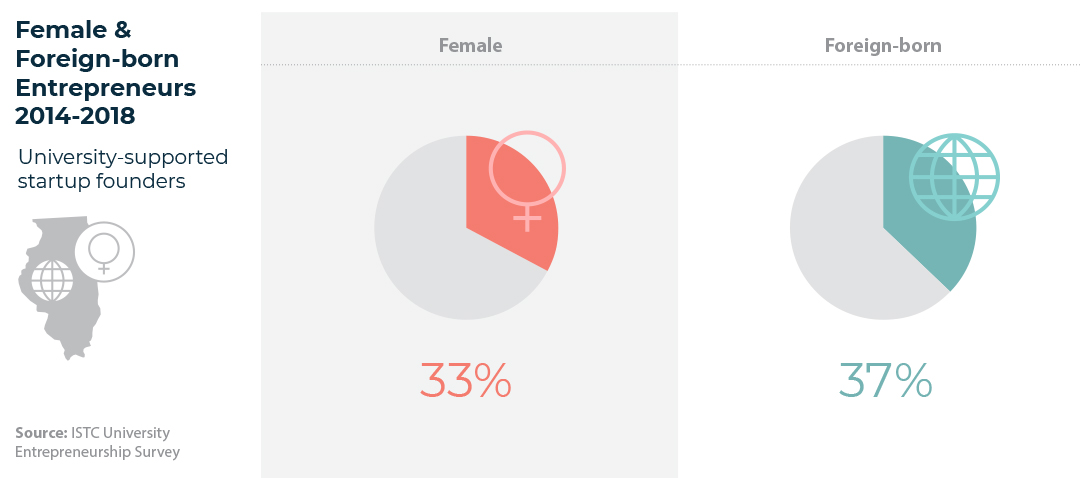
The strength of Illinois’ universities attract talented students and faculty from around the world. To the benefit of Illinois’ economy, much of this foreign-born talent is choosing to pursue entrepreneurship. Over the past five years, an estimated 37 percent of startups had at least one foreign-born founder.[8] This finding matches national data on immigrant entrepreneurs. Nationally, 31 percent of all venture-backed startups and 51 percent of startups valued over $1 billion have at least one immigrant founder.[9] The critical role of immigrant entrepreneurs in new venture creation illustrates the need for a startup visa in the US, which would allow immigrant founders to stay in the country to grow their ventures.
Northwestern Supporting Women in Entrepreneurship
Northwestern University is taking on underrepresentation with its new Propel Program for female students in entrepreneurship. Launched in 2018 under the direction of Northwestern’s Innovation and New Ventures Office (INVO) and The Garage incubator, the Propel Program supports networking, mentorship, and immersive learning experiences that promote diversity and inclusion in the invention-to-innovation-to-entrepreneurship lifecycle. Activities supported by the program include; immersion trips to New York and San Francisco to hear from women in successful innovation leadership positions; a pitch competition that allows students to pitch their startup ideas to a panel of female mentors to help further develop ideas; and the VentureCat Idea Show, where Northwestern’s most promising student-founded startups teams network and pitch their ventures to an esteemed panel of judges and the broader community. The Propel Program is made possible by gift from Northwestern Kellogg School of Management alumnus Steve Elms and his wife Katherine Thomas Elms.
Illinois Universities Foster Alumni Entrepreneurship
University impact on entrepreneurship extends beyond graduation. In recent years, Illinois’ universities have expanded resources to support alumni who choose to pursue entrepreneurship after graduation. These resources include on-campus programming, online courses, connecting entrepreneurs with existing startups, and establishing alumni entrepreneurship networks. These activities provide alumni with the support needed to launch new ventures.
Northwestern University, the University of Chicago, and the University of Illinois at Urbana-Champaign (UIUC) are all among national leaders in the production of alumni entrepreneurs.[10] Both Northwestern and UIUC are among the top 30 programs for undergraduate alumni entrepreneurship. Over the past decade, alumni from Northwestern and UIUC have produced nearly 850 startups and raised over $13.5 billion in funding. Both universities are also in the top 10 for alumni founded unicorn startups (those valued at more than $1 billion). MBA programs at Northwestern’s Kellogg School of Management and the University of Chicago’s Booth School of Business are also in the top 10 for production of alumni entrepreneurs.
UIC Funding Aims to Catalyze Commercially Viable Projects
The University of Illinois at Chicago’s Chancellor’s Translational Research Initiative (CTRI) is funding available to support projects that have high potential for commercialization. CTRI funding is designed to aid innovations that are not yet at proof of concept stage, where they could receive venture capital or be licensed by industry partners. Early-stage funding through CTRI makes these projects more attractive for licensing or startup opportunities, with the goal of advancing UIC innovations to a commercialization outcome. Through CTRI, UIC faculty innovators have the opportunity to receive up to $25,000 per project to advance technology originating at UIC. In addition to CTRI, IllinoisVENTURES invests in companies created through UIC research.
Startup Spotlight: Dystrogen Therapeutics
Dystrogen Therapeutics is a life sciences startup developing a unique treatment for rare genetic diseases, including a rare form of muscular dystrophy called Duchenne muscular dystrophy. Dystrogen was founded in 2017 by Dr. Maria Siemionow, professor of orthopedic surgery, and her son, Dr. Kris Siemionow, associate professor of orthopedic surgery at the University of Illinois at Chicago College of Medicine. Duchenne muscular dystrophy affects approximately 1 in 4,000 newborn boys, causing progressive muscle degeneration and ultimately results in fatal respiratory or cardiac failure. Though advances in treatment have extended life for many with Duchenne muscular dystrophy, there is currently no cure for the disease.
Dystrogen Therapeutics is advancing the use of blended cells called “chimeric cells” to treat Duchenne muscular dystrophy. This approach treats the disease by using a cell that contains the dystrophin protein, which is lacking in Duchenne patients. The treatment has been shown to increase dystrophin levels by 35 percent in mice. Only a 20 percent increase in dystrophin levels is needed to significantly reduce many of the symptoms associated with Duchenne muscular dystrophy. Based on this success, Dystrogen is aiming to begin pre-clinical trials in the near future.
University Commercialization Shows Mixed Growth
In addition to the creation of startup companies, innovations made possible by university research can become commercially available through the technology transfer (tech transfer) process. This process typically involves three key steps: 1) the disclosure of a new technology made possible through university research, 2) the protection of the technology through patents or copyrights, and 3) commercialization of the technology through license or options agreements.
In 2017, Illinois universities disclosed 748 inventions and were awarded a record-breaking 250 patents. Universities in the state also created 173 license or options agreements in 2017. Illinois universities brought in $287 million in income from licensing in 2017, ranking fourth nationally.
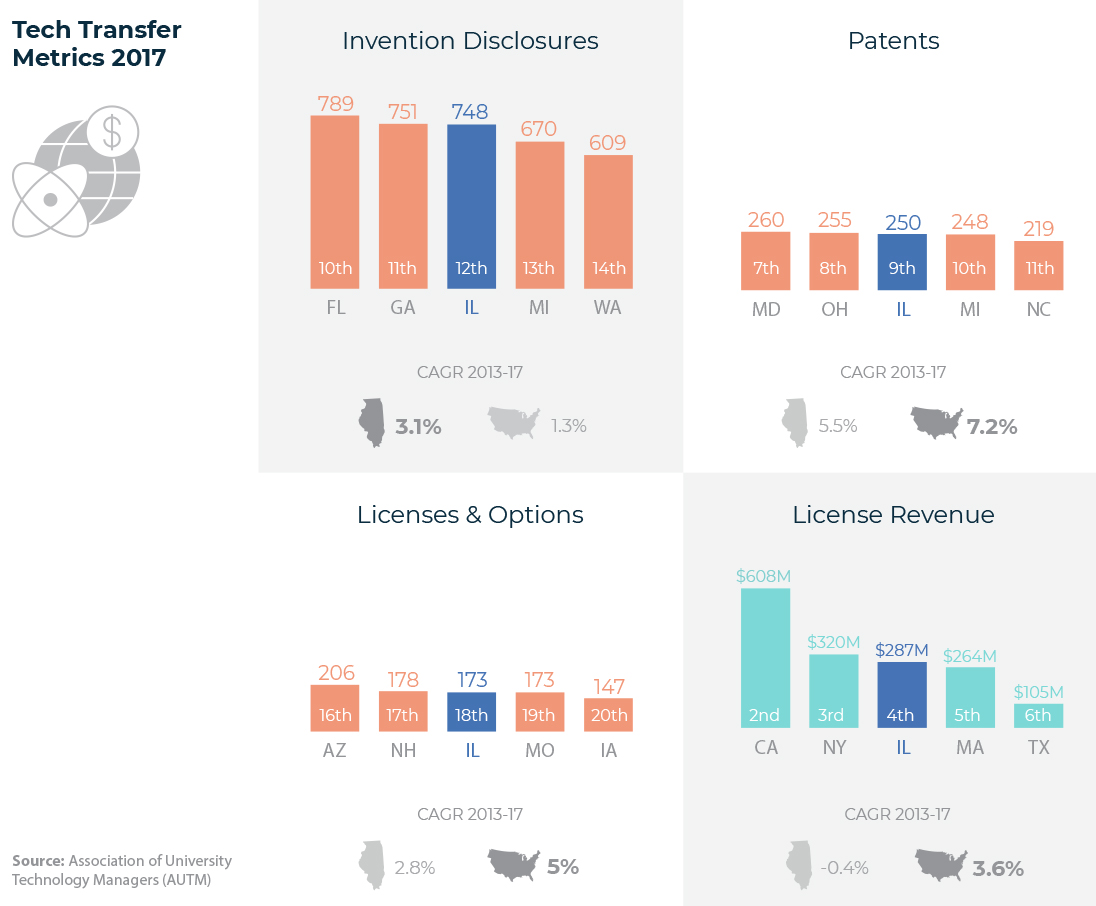
Loyola Connecting a Network of Entrepreneurs Virtually
Loyola University Chicago’s Ignite Lab is a virtual incubator that provides students, faculty, and staff with knowledge, support, and resources for developing their own for-profit, non-profit, or social venture. Ignite Lab’s services include guidance on how to launch a new venture or grow an existing one; mentors from Loyola and the external startup community; and workshops geared toward the challenges faced at each business stage. The Lab leverages Loyola’s academic expertise to connect its members with Chicago’s vibrant startup community, including access to 1871, Chicago’s premier co-working space for entrepreneurs; participation in Next Founders, the undergraduate entrepreneurship club; and exclusive access to information about jobs and internships.
Startup Spotlight: Natural Fiber Welding
Natural Fiber Welding, Inc. (NFW) is bringing revolutionary materials to market made solely from natural materials to replace plastics. Founded by Bradley University chemistry professor Luke Haverhals, NFW is commercializing intellectual property developed with over $10 million of transformative fundamental and applied materials research, all seeking to allow natural materials to be and do more. NFW uniquely allows natural fibers to fuse together without any petroleum-based glues, resins, or polymers, enabling new all-natural composite materials to be applied to a wide variety of applications.
NFW is using its unique process to create new leather alternatives amid growing concern over the hundreds of billions of dollars of leather goods sold globally each year. Textile industry experts have pointed out major problems with both ‘natural’ and ‘vegan’ leather products in the market today. Natural leather is controversial due to its use of animals and unsustainable tanning processes, yet vegan alternatives today are exclusively based on plastic. NFW is bringing to market vegan leather materials that do not compromise the term ‘vegan’. While production capacity is being built out in Peoria, Illinois, the NFW team is sampling new materials globally in the areas of accessories, outerwear, furniture, and footwear.
New Kaplan Institute Promotes Collaborative Entrepreneurship
Opened in late 2018, Illinois Tech’s Ed Kaplan Family Institute for Innovation and Tech Entrepreneurship is designed to advance critical and creative ideas, foster interdisciplinary and external collaboration, and create a culture of innovation and tech entrepreneurship on the Illinois Tech campus. The Kaplan Institute creates a new interactive space where students and faculty can develop ideas for new businesses and civic/social solutions; provide students instruction in the basics of innovation, entrepreneurship, and human-centered design; and act as a new front door for business and industry to better access the university’s resources in order to solve next-generation problems. To advance these goals, the Institute houses and supports programming of Illinois Tech’s Interprofessional Projects (IPRO) Program, the Entrepreneurship Academy, Jules Knapp Entrepreneurship Center, Grainger Maker Space, and Janet & Craig Duchossois Idea Shop.
Looking Forward
Leveraging University Efforts for Economic Growth
In 10 years of data tracked by the University Entrepreneurship issue of the Illinois Innovation Index, we’ve seen startup activity flourish as universities expand resources and support for ventures created on campuses around the state. As a result of growing entrepreneurial support, startup activity over the past five years has grown by more than 150 percent over the previous period. Funding for these startups has also grown tremendously, reaching well over $1 billion. The growth of university-supported startup activity represents a clear path toward economic growth for Illinois.
Universities are doing the hard work of spurring startup creation and providing resources to increase their viability. In the past several years, they’ve also built a pipeline to resources provided by the state’s broader startup ecosystem, creating hand-offs that result in persistent support to early-stage startups exiting university entrepreneurship centers. As a result of this pipeline, four out of five active university startups founded over the past five years are located in Illinois. However, startups raising higher-level funding are more likely to be located outside the state. It’s these high-growth, technology-backed, startups that Illinois must work to attract and retain.
Compared with the state’s R&D activity (8th nationally in total R&D), Illinois pulls below its weight in accessing federal funds for technology commercialization. This funding, typically accessed via the SBIR/STTR program, increases viability and retention for university-supported startups. The NSF I-Corps program is one tool that can be used to build a funnel to this catalyzing federal funding. Data show that startups completing the I-Corps program are more than three-times more likely to receive an SBIR/STTR award. While the I-Corps program continues to expand at its two in-state sites, the state should join many of its peer states by offering matching funds for startups receiving SBIR/STTR awards. Matching funding creates an increased incentive to participate in the program, while also creating a tether to the state for homegrown startups.
Illinois’ universities and broader startup ecosystem should also look to further support underrepresented groups in entrepreneurship. Data show diversity and inclusion efforts are paying off for female entrepreneurs from Illinois universities, where the rate of women in entrepreneurship is nearly twice the national rate. In addition, the high rate of entrepreneurship among foreign-born students and faculty at Illinois’ universities means the state stands to benefit from federal immigration reform that includes a startup visa for immigrant founders.
[1] For brevity, academic years 2013-2014 to 2017-2018 are referenced as 2014 to 2018 in the remainder of the Index.
[2] US Small Business Administration, 2017.
[3] Job creation estimates are based on data submitted by university partners, supplemented with publicly available sources, including LinkedIn profile data and company website staff listings.
[4] Includes all Illinois companies, not only university-supported startups.
[5] University startups founded prior to 2013-2014 also received SBIR/STTR funding, but are not included in this total.
[6] Based on a subset of 578 startups for which data were available.
[7] Crunchbase Women in Venture Report, 2017.
[8] Based on a subset of 186 startups for which data were available.
[9] Why Immigrant Entrepreneurs are Crucial for America’s Future, National Venture Capital, 2017.
[10] Pitchbook University Report, 2018.
Download the Index
Methodology
Data for this Index comes primarily from ISTC’s University Entrepreneurship Survey, supplemented by data partners Crunchbase, Pitchbook, and AUTM. For more information, read our full methodology.
Archive
2018 - University Entrepreneurship Index
Illinois Retains More Startups Than Ever Before
2017 - University Entrepreneurship Index
Illinois university startups surge to record level
2016 - University Entrepreneurship Index
A detailed look at university startup creation, tech transfer, and local funding trends
2015 - University Entrepreneurship Index
Illinois universities spur innovation through technology transfer and entrepreneurship
2014 - University Entrepreneurship Index
Dynamism in Illinois: Tracking technology development at universities and research institutions from inception to commercialization

